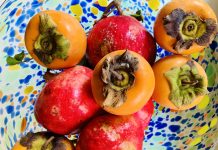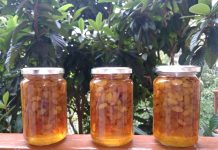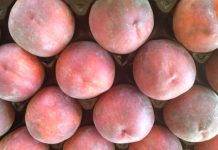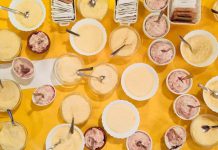 Ολοι μιλάμε για τα τοπικά ελληνικά προιόντα , για Προιόντα με Ονομασία Προέλευσης (ΠΟΠ) , για μοναδικές φακές Εγκλουβής, όσπρια Φενεού, φάβα και ντοματάκι Σαντορίνης, κορινθιακή σταφίδα… Διάβασε τη συνέντευξη που μου παραχώρησε ο Pierre Sultana , της οργάνωσης www.arche-noah.at και ένωσε τις τελείες μεταξύ παραδοσιακών ποικιλιών , ελληνικών προιόντων (που χρόνια τώρα προσπαθούν να γίνουν μοχλός ανάπτυξης για τους νέους αγρότες αλλά και εξαγώγιμο επώνυμο προιόν!!!) και της καινούργιας ευρωπαικής νομοθεσίας …
Ολοι μιλάμε για τα τοπικά ελληνικά προιόντα , για Προιόντα με Ονομασία Προέλευσης (ΠΟΠ) , για μοναδικές φακές Εγκλουβής, όσπρια Φενεού, φάβα και ντοματάκι Σαντορίνης, κορινθιακή σταφίδα… Διάβασε τη συνέντευξη που μου παραχώρησε ο Pierre Sultana , της οργάνωσης www.arche-noah.at και ένωσε τις τελείες μεταξύ παραδοσιακών ποικιλιών , ελληνικών προιόντων (που χρόνια τώρα προσπαθούν να γίνουν μοχλός ανάπτυξης για τους νέους αγρότες αλλά και εξαγώγιμο επώνυμο προιόν!!!) και της καινούργιας ευρωπαικής νομοθεσίας …
1.What is the existing law in Europe regarding traditional seeds now and when was this law passed and by whom?
Traditional seed are presently ruled by the so called Legislation on Conservation Varieties. This legislation is composed from two Commissions directives. The first one, Regulation 2008/62 rules the agricultural landraces and the second, Regulation 2009/145 rules the vegetable landraces. This legislation is very recent but is a failure, keeping in place what is the most problematic for traditional seed: the DUS tests (Distinct, Uniform, Stable), like for the industrial seed. Only few species are benefiting from these rules – around 250 in all Europe, whereas each seed savers’ associations are often saving several thousand of varieties. However, it was a first step towards a more biodiversity friendly legislation on seed, which shows that the legislation is really not well balanced, as Ms Kokott, General Advocate of the European Court of Justice said in the Kokopelli case.
2.Is there one law that all european countries follow or is there any room for independent national agricultural action?
Both. The legislation on seed is composed of 12 directives. In EU law, the directives are the tool which describes the main principles and goals of a legislation but let to the Member States the manner to achieve these goals. This means that in each Member State, one will find the core of the legislation, which is the system of registration and certification of seeds, but there are sometimes some small differences between the different legislations (i.e. the cost for the tests…).
In addition, the two regulations on conservation varieties only offer to Member States ,which would like to implement such a system, the possibility to create one.
3.What are the pitfalls in the new law that will pass in March, which are the most important paragraphs that things could go wrong?
It is difficult to say as the EU Commission is still working on the proposal. Because the seed legislation is designed for industrial seeds, the biggest danger would be to impose the same rules for traditional varieties as for industrial seeds. Traditional seeds are guests that are forced to participate in such a system. We must fight any limitation to their exchange. Exchanges of seeds between farmers, between individuals and between farmers and individuals must be excluded from the scope of the legislation, as well as the different activities of the associations fighting for the biodiversity! Already too much biodiversity has been lost.
4.Why is this law that will pass in March in the EC council important?
This legislation will replace the 12 sectorial seed laws and the 2 laws on conservation varieties. Therefore, this legislation will rule (or exclude from its scope) all exchanges of seeds. This law will decide if it is legal to exchange seeds and under what conditions. Therefore, it will have an impact on the present and future biodiversity.
5.Which are the organizations that oppose the existing law and why and which are the organizations and NGO’s that press to change the law?
Most seed savers groups oppose to this legislation that participated in the decrease of agricultural biodiversity (75% in one century, says the FAO!!). Also the small farmers and the organic sector take an active part in fighting for a more biodiversity friendly seed law. Some coalitions of groups from different backgrounds such as the seedforall.org initiative also take an active part in the system. From the other side, the seed industry puts a lot of pressure on the different Brussels based institutions.
6.Is it a different law regulating traditional herbs production and distribution than the one for seeds?
There is another European legislation on traditional herbs for medicinal use, but this legislation is different than the one on seeds (even if the same principles more or less apply: marketing authorization, registration of the herbs).
7.How do you see the future of food, its production and its distribution?
Industrial agricultural systems have a huge impact on the environment. Our generations are destroying the planet, only for the profit of some industries. Productivity is industry’s keyword, “we have to feed the world”, they say. The reality beside the destruction of the environment is the waste of food in Europe and the starvation in developing countries, where local and often sustainable farming systems have been destroyed by the industry. In addition, these products are often of a lower quality from the point of view of the taste and the nutrition.
Therefore, I believe that the future of food and agriculture are based on a sustainable, low impact but high quality production and distribution, far from the globalization of agricultural goods. Plants which are genetically broad have often been adapted to local on-farm conditions. This means that contrary to the industrial seeds, they may not need to compensate their lack of adaptation with the use of chemicals.
8.Please give us some numbers in reference to the Agricultural production of Europe. How many hectares are grown with traditional seeds and in which products?
It is very difficult to estimate. Consumption farmers and gardeners grow a lot of traditional varieties in all European countries, mainly vegetable varieties, but also cereals…
9.Is Europe any different from the USA in the seeds legislation?
Yes, from the very beginning, these two systems are opposed: where in Europe, countries have decided to regulate the market by the legislation, the US decided to let the market regulate by itself. Indeed, the idea behind the American system is that a farmer or a gardener who had a bad experience the first year will not buy this seed again. Therefore, the “bad seeds” will automatically be thrown out of the market. Although there is a similar seed catalogue in the US, the rules for registration are much more flexible.
On the contrary, in Europe, the idea was to protect the farmer and to fight against starvation by making sure that the only seeds of good quality are available on the market. At this time, the communication’s tools were not as developed as they are now. For different reasons, we might question in fact this system which denies other qualities than productivity is still in place today.
10.Please, pass on to us a few information about yourself, your job description and one or two personal experiences from your job, related to the seeds movement. In other words, why is this important to you and what is Arche Noah exactly?
Arche Noah is a seed savers association from Central Europe. Based in Austria, we have more than 10.000 members mainly coming from Central European and German speaking countries. We are protecting over 6.000 old, rare and traditional varieties.
I am doing advocacy work in Brussels for Arche Noah. The review of the seed law is on-going. It will have a direct impact on the future biodiversity and on the diversity of colors and tastes on the table. We do not want this! We do not want someone else to impose us to eat e.g. tomatoes which just taste like water!
The best parts of my job are the meetings. It is very interesting and motivating to see the different points of views from the different countries, the different actions to fight, at different scales for consumers, farmers and gardeners rights, for their well-being and for biodiversity. This was the case during my last meeting with the seed savers in Athens, organized by Peliti and Aegilops or the last Let’s Liberate Diversity forum in Scotland! Great experience with great people!! It reinforces the will to fight for biodiversity and for our rights!


























